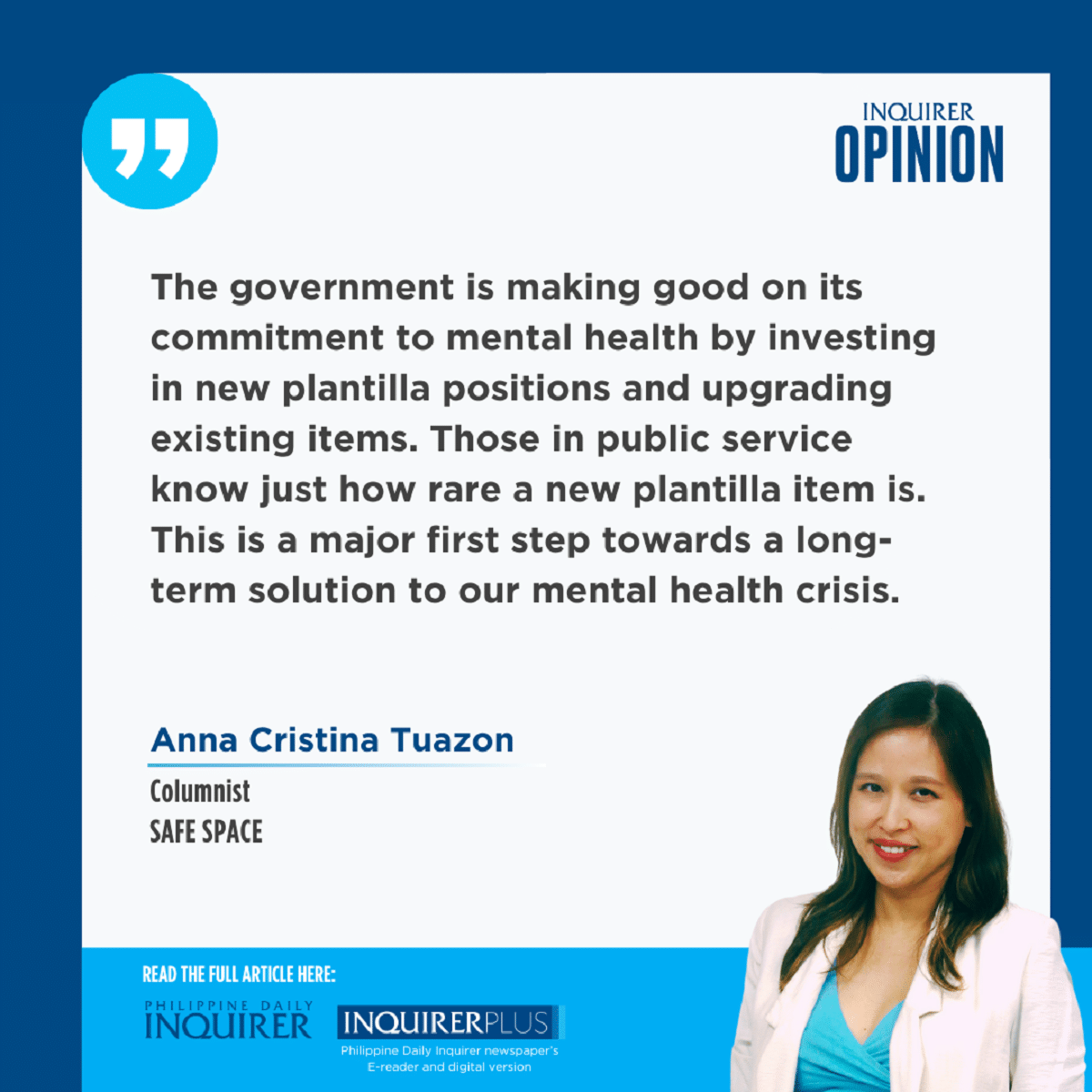Wish list granted: Plantillas for mental health
It’s been a promising week for mental health.
On Monday, President Marcos signed Republic Act No. 12080 or the Basic Education Mental Health and Well-Being Promotion Act. This law institutionalizes school-based mental health programs in public schools in the form of care centers meant to deliver mental health services such as screening, crisis response, referrals, and other supportive measures for learners and staff.
Article continues after this advertisementNew plantilla positions have also been established: School Counselor Associate I to V (salary grade (SG) 11 to 15) and School Counselor I to IV (SG 16 to 22). A Mental Health and Well-Being Office will also be set up in every Schools Division Office to oversee the implementation of mental health programs, to be headed by a Schools Division Counselor (SG 24), a newly created position.
Alongside this development, the Department of Budget and Management released Budget Circular 2024-5, which upgraded the Psychologist plantilla positions (Psychologist I, II, and III) that currently sit at SG 11 to 18, to SG 16 to 20, which acknowledges that registered psychologists hold advanced degrees and specialized training. Departments without existing psychologist items are also encouraged to apply for them with the goal of creating mental health programs for each government agency.
This is a welcome Christmas gift. The government is making good on its commitment to mental health by investing in new plantilla positions and upgrading existing items. Those in public service know just how rare a new plantilla item is. This is a major first step toward a long-term solution to our mental health crisis. I am cautiously optimistic now that government is willing to put in money to increase public access to mental health services.
Article continues after this advertisementHowever, this is only the beginning. I await the official publication of the signed law to scrutinize its specifics. But based on the Senate and House versions, the scope and mandate of the care centers and their personnel are massive. Even with the pay upgrade, the expectation seems too much for a small office to handle: prevention and promotion, screening and evaluation, counseling and monitoring, crisis response, and suicide prevention. The bulk of the work seems to be on these soon-to-be hired school personnel whose expertise is being sought to develop the mental health programs, not unlike the burden already faced by existing guidance counselors. Therefore, we need to watch out for possible burnout among care center staff.
In trying to increase capacity, the law also pins its hopes on the creation of School Counselor Associates, who are bachelor’s degree graduates in guidance and counseling, psychology, and other related fields. First problem: very few universities offer a bachelor’s degree in guidance and counseling as this is offered at the graduate level. Second problem: most undergraduate curricula in Psychology and other social sciences are not designed to train students in providing mental health services, as the disciplines are scholarly by nature.
For example, in our own experience in exploring the possibility of having undergraduate internships in our university-based center, we had a hard time identifying what services undergrads are equipped to handle, without risking the quality of care for our student-clients. The reality is that most of the services and skills required by the work need both advanced training and experience, both in psychology and in guidance and counseling. It is akin to having a health center filled with employees who can only do first aid.
The misconception about school-based mental health is that cases in this setting are somehow milder or less severe than clinical settings. Our experience, however, is that we see the widest range of cases in schools—from identity issues and relationship concerns, to more severe issues like abuse and suicide. The alarming rate of suicide risk in schools, even among young children, should have pointed us to the need for highly skilled mental health staff.
I suggest that care centers make room for a team approach. Rather than focusing solely on counselors, let us use the strengths of various professions. The next item on my wish list is a care team composed of psychiatrists, developmental pediatricians, psychologists, guidance counselors, social workers, occupational and physical therapists, speech therapists, and special education specialists. If this cannot be done for every school, at least let every school division create one.
A team approach is necessary since mental health concerns come from a variety of sources—the students’ developmental and learning capacity, their physical health and nutrition, and their school and home environments. This can also further equitable access to services by ensuring that school-based services don’t simply end in a referral that gets thrown away because students and their families can’t afford it. To cover more ground, we need to be more collaborative, not hierarchical.
—————-
aatuazon@up.edu.ph

















